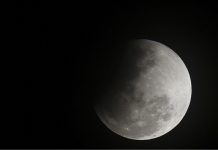The moon will soon totally eclipse the sun – an event rare enough to be measured in centuries. This is a suitable occasion, then, to think about the moon, Earth and humanity. But I also have a more prosaic reason to do so: I am in the process of writing a book on the geopolitics of the moon, so the eclipse has given me an excuse to flesh out some early thoughts. (I assure you that, psychologically, writing for immediate public consumption is dramatically different from endlessly sawing away for the future.)
The primary issue at stake is the relationship of the moon to Earth. Indeed, the moon is intimately connected to Earth. Long ago, a planet roughly the size of Mars brushed by Earth, tore a large chunk of our planet away and placed it in orbit around Earth – or so the dominant theory goes. Though this seems cosmically unlikely, people who know about such things insist that it is true and that it undoubtedly affected the shape of Earth, its climate and perhaps even global agriculture.
The most striking theory is that the moon is filled with valuable minerals on which much of Earth’s economy is built. If it indeed struck Earth many years ago, it must be assumed that a substantial amount of Earth’s mineral structure was torn away with it. If this is true, the moon must be a mineral-rich planet and thus a foundation of wealth. It is known that the moon has substantial amounts of water, for the most part frozen, as well as the ability to capture enormous amounts of energy, radiated by the sun, that could drive industry on the moon and a great deal of Earth’s energy, assuming it is retransmitted to Earth.
The moon is also an excellent place from which to influence or even dominate Earth. It could become a military base from which a hostile enemy could bombard Earth with solar power or boulders procured from the surface of the moon. Equally important, it is an excellent defensive point with offensive weapons hidden beneath its crust, able to withstand attacks – even nuclear attacks – by digging into its surface. Rather than a vast wasteland, a well-defended lunar base would be able to intersect attacks in the Earth-moon area of space and protect mining and industrial installations.
This is a primitive sketch of the significance of the moon. Much must still be learned. But the interest, especially the interest of the United States, is there. In fact, Washington will launch a series of manned missions ultimately designed to establish a base that might stand for a substantial amount of time.
“He who controls Eastern Europe controls the world” has long been a common refrain in the history of geopolitics. I am not sure how true this is, but it sounds definitive. I take much more seriously the principle that, “He who controls the moon controls Earth.” If, as it is assumed, the moon has the resources needed to sustain a long-term presence, energy to control near space and weapons with which to defend it, the proposition makes some sense. After all, the moon is the ultimate high ground, providing clear vision to detect attacks and material that might attract Earth-based powers to seek an alliance with the moon – assuming the proposition that humans might live on the moon merely to become wealthy. There are obvious and not-so-obvious reasons why this might not work, but it should be remembered that Europeans went to South America seeking gold, silver and all the rest. Given current technologies, the relative distance between Portugal and Brazil and between the moon and Portugal is not wildly different. The voyage to the moon may even seem less daunting.
Humans pursue wealth and will use military power to attain it. The history of the world is the history of movement and the struggle for wealth. It seems to me that, if the value many assume the moon possesses comes to fruition, geopolitics might continue to govern in a new game.







